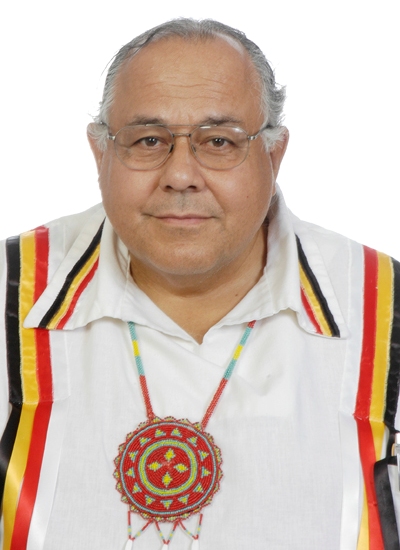
Frank Ettawageshik lives in Harbor Springs, Michigan, with his wife Rochelle. He has four adult children and six grandchildren. He is a traditional storyteller and potter, believing that Native Peoples need to be rooted in their traditions in order to be prepared for the future.
He served in Tribal elected office for sixteen years, fourteen as the Tribal Chairman of the Little Traverse Bay Bands of Odawa Indians in Harbor Springs. During his tenure as Tribal Chairman he was instrumental in the adoption of the Tribal and First Nations Great Lakes Water Accord in 2004 and the United League of Indigenous Nations Treaty in 2007. Now serving as the Executive Director of the United Tribes of Michigan, he is also the Chairman of the United League of Indigenous Nations Governing Board and the Co-chair of the National Congress of American Indians Federal Recognition Task Force.
Frank currently serves on several non-profit boards including the Association on American Indian Affairs, Anishinaabemowin Teg and the Michigan Indian Education Council. In April 2016 he was appointed to the Great Lakes Water Quality Board. Frank was a 2010 Fellow at the Native Nations Institute Indigenous Leaders Fellowship Program at the University of Arizona. His 40 years of public service have included serving on the Executive Board of the National Congress of American Indians, the Midwest Alliance of Sovereign Tribes, the Historical Society of Michigan, the Chippewa Ottawa Resource Authority, the Michigan Climate Action Council, the Little Traverse Conservancy, the Michigan Travel Commission, the Public Interest Advisory Group for the International Joint Commission’s Upper Great Lakes Study, the Michigan Great Lakes Offshore Wind Council, and the Michigan Ground Water Conservation Advisory Council.
In December 2015 he attended the United Nations Framework Convention on Climate Change, Council of the Parties 21 (UNFCCC COP21) in Paris, France, as a delegate from the National Congress of American Indians. Approximately 45,000 people attended COP21 including over 100 Heads of State. Frank joined approximately 200 Indigenous Peoples delegates as a member of the International Indigenous Peoples Caucus on Climate Change.
He served in Tribal elected office for sixteen years, fourteen as the Tribal Chairman of the Little Traverse Bay Bands of Odawa Indians in Harbor Springs. During his tenure as Tribal Chairman he was instrumental in the adoption of the Tribal and First Nations Great Lakes Water Accord in 2004 and the United League of Indigenous Nations Treaty in 2007. Now serving as the Executive Director of the United Tribes of Michigan, he is also the Chairman of the United League of Indigenous Nations Governing Board and the Co-chair of the National Congress of American Indians Federal Recognition Task Force.
Frank currently serves on several non-profit boards including the Association on American Indian Affairs, Anishinaabemowin Teg and the Michigan Indian Education Council. In April 2016 he was appointed to the Great Lakes Water Quality Board. Frank was a 2010 Fellow at the Native Nations Institute Indigenous Leaders Fellowship Program at the University of Arizona. His 40 years of public service have included serving on the Executive Board of the National Congress of American Indians, the Midwest Alliance of Sovereign Tribes, the Historical Society of Michigan, the Chippewa Ottawa Resource Authority, the Michigan Climate Action Council, the Little Traverse Conservancy, the Michigan Travel Commission, the Public Interest Advisory Group for the International Joint Commission’s Upper Great Lakes Study, the Michigan Great Lakes Offshore Wind Council, and the Michigan Ground Water Conservation Advisory Council.
In December 2015 he attended the United Nations Framework Convention on Climate Change, Council of the Parties 21 (UNFCCC COP21) in Paris, France, as a delegate from the National Congress of American Indians. Approximately 45,000 people attended COP21 including over 100 Heads of State. Frank joined approximately 200 Indigenous Peoples delegates as a member of the International Indigenous Peoples Caucus on Climate Change.









